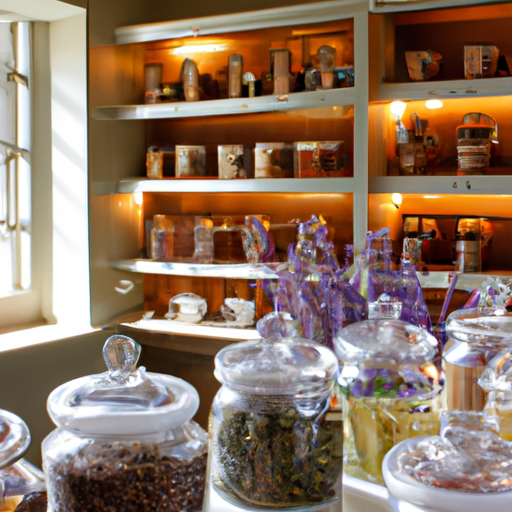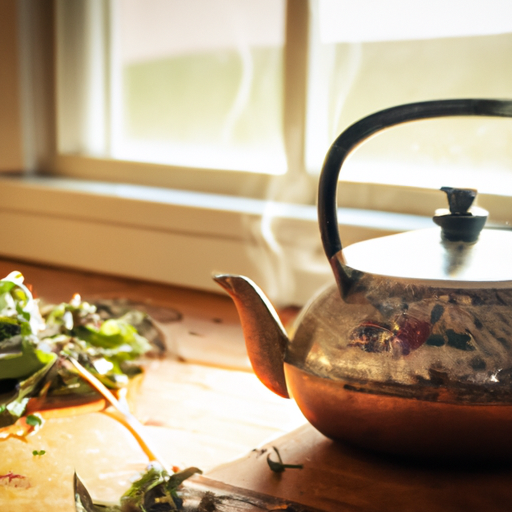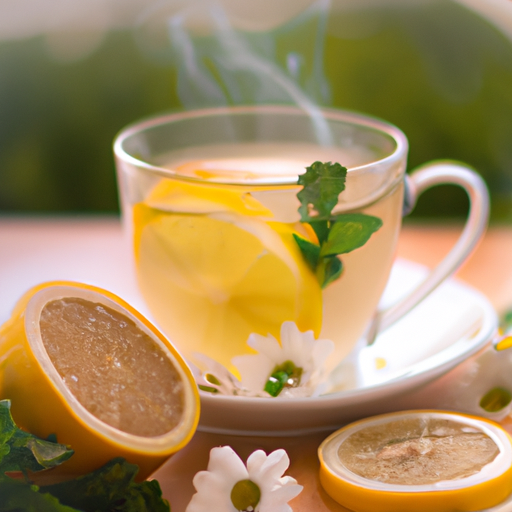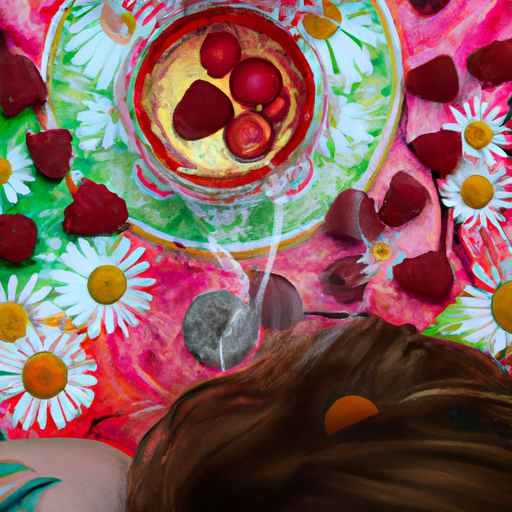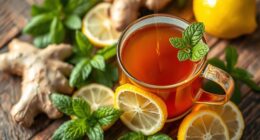I don’t know about you, but I love a good cup of herbal tea. There’s just something so soothing about sipping on a warm and fragrant brew, especially on a chilly day or when I need a moment of relaxation.
But have you ever wondered how often you can indulge in this delightful beverage? Well, you’re in luck! In this article, we will explore the recommended daily intake of herbal tea, along with its health benefits, potential side effects, and tips on brewing and preparation.
So, if you’re like me and can’t get enough of herbal tea, or if you’re curious about incorporating it into your daily routine, keep reading. By the end, you’ll have a better understanding of how often you can enjoy this comforting drink and how to make the most out of your herbal tea experience.
Key Takeaways
- Herbal tea can be enjoyed regularly throughout the day, including in the evening.
- Herbal tea promotes relaxation and overall well-being.
- Herbal tea can help reduce stress and aid in digestion.
- It is important to stay hydrated and incorporate herbal tea into your daily routine.
Health Benefits of Herbal Tea
Drinking herbal tea regularly can boost your overall health and well-being. Herbal teas are made from different types of herbs, such as chamomile, peppermint, and ginger. Each herb has its own unique health benefits. Unlike other types of tea, herbal teas are naturally caffeine-free, making them a great alternative for those looking to limit their caffeine intake.
Additionally, herbal teas are rich in antioxidants. These antioxidants can help reduce inflammation and protect against chronic diseases. They also have calming properties, making them a popular choice for relaxation and stress relief.
Compared to other types of tea, herbal teas offer a wider range of flavors and potential health benefits. Incorporating herbal tea into your daily routine can be a simple and enjoyable way to support your overall health.
Types of Herbal Tea
Exploring the diverse array of herbal tea options allows for a deeper appreciation of the various types available. From soothing chamomile to invigorating peppermint, there are endless flavors to suit every palate.
Not only do these teas offer a delightful taste experience, but they also provide numerous benefits for digestion. Herbal teas like ginger and fennel can aid in soothing an upset stomach and relieving bloating. Additionally, peppermint tea has been shown to relax the muscles of the gastrointestinal tract, promoting healthy digestion.
When it comes to herbal tea, the flavors are as diverse as the benefits they offer. Whether you’re looking for a calming cup before bed or a refreshing boost to start your day, there is a herbal tea for every occasion.
So why not explore the wonderful world of herbal teas and discover the flavors that can enhance your well-being?
Recommended Daily Intake
One must be mindful of the recommended daily intake of herbal tea to maintain a balanced and healthy lifestyle. Herbal teas are generally safe to consume, but it is important not to exceed the recommended daily amount. The recommended daily intake of herbal tea varies depending on the type and individual factors such as age and overall health. It is generally recommended to consume no more than 2-3 cups of herbal tea per day. Excessive intake of herbal tea can lead to health risks such as dehydration, digestive issues, and potential interactions with medications. It is always best to consult with a healthcare professional to determine the appropriate amount of herbal tea for your specific needs.
| Health Benefits | Health Risks |
|---|---|
| Relieves Stress | Dehydration |
| Promotes Sleep | Digestive Issues |
| Boosts Immunity | Medication Interactions |
Potential Side Effects
When it comes to herbal tea, it’s important to be aware of potential side effects that may arise.
Allergic reactions and sensitivities are something to consider, as some individuals may have adverse reactions to certain herbs.
Additionally, it’s crucial to be cautious of any interactions with medications, as herbal teas can sometimes interfere with the effectiveness of certain drugs.
Lastly, for those who are sensitive to caffeine, it’s worth noting that some herbal teas may contain caffeine, so it’s important to choose caffeine-free options if necessary.
Allergic reactions and sensitivities
To avoid any potential allergic reactions or sensitivities, you should assess how often you can indulge in herbal tea. While herbal tea is generally considered safe for consumption, it’s important to note that some individuals may experience allergic reactions or sensitivities to certain herbs.
Common symptoms of an allergic reaction can include itching, hives, swelling, and difficulty breathing. Sensitivities, on the other hand, may result in digestive issues such as stomach pain, bloating, or diarrhea.
If you have a known allergy or sensitivity to a specific herb, it’s best to avoid consuming herbal teas that contain that particular ingredient. Additionally, it’s always a good idea to start with small amounts and gradually increase your intake to monitor any potential reactions.
If you experience any severe or persistent symptoms, it’s important to seek medical advice.
Interactions with medications
Be cautious of potential interactions with medications when consuming herbal tea. While herbal teas are generally safe and beneficial for many people, it’s important to be aware of any potential interactions with medications you may be taking. Some herbal teas can interact with certain medications, either by increasing or decreasing their effects. For example, St. John’s wort tea can interact with antidepressant medications and reduce their effectiveness. It’s also important to consider dosage when consuming herbal teas, as high doses may have a stronger effect and potentially interact with medications. It’s always a good idea to consult with your healthcare provider or pharmacist before incorporating herbal teas into your routine, especially if you are taking any medications or supplements.
Here is a table summarizing some common interactions between herbal teas and medications:
| Herbal Tea | Medications | Potential Interaction |
|---|---|---|
| St. John’s Wort | Antidepressants | Reduced effectiveness of antidepressant medication |
| Chamomile | Sedatives | Increased drowsiness |
| Echinacea | Immunosuppressant drugs | Reduced effectiveness of immunosuppressant medication |
| Ginseng | Blood thinners | Increased risk of bleeding |
Remember to always read labels, follow recommended dosage instructions, and seek professional advice when incorporating herbal teas into your regimen.
Caffeine content in herbal teas
Discover the invigorating flavors of caffeine-free herbal teas and indulge in their natural goodness.
When it comes to herbal teas, you have a wide range of caffeine-free options to choose from. These teas are made from a variety of plants and herbs, offering unique flavors and health benefits.
Here are two sub-lists to help you explore the world of caffeine-free herbal teas:
-
Herbal teas with no caffeine:
- Chamomile: Known for its calming properties, chamomile tea is a popular choice for relaxation and better sleep.
- Peppermint: Refreshing and soothing, peppermint tea aids digestion and can help relieve headaches.
-
Herbal teas with trace amounts of caffeine:
- Rooibos: This South African tea is naturally caffeine-free, making it a great alternative to black or green tea.
- Yerba mate: Although it contains some caffeine, yerba mate provides a more gentle energy boost compared to coffee.
Remember, the effects of caffeine in herbal teas are generally milder compared to caffeinated beverages. So, feel free to enjoy these caffeine-free herbal teas throughout the day without worrying about jitters or sleep disturbances.
Brewing and Preparation Tips
For a perfectly brewed cup of herbal tea, remember to steep the tea bag or loose leaves in hot water for the recommended amount of time. Brewing techniques play a vital role in extracting the full flavor and benefits from the herbs.
Start by selecting the right tea for your taste preferences and desired health benefits. Different herbs have different flavors and properties, so it’s important to choose one that suits your needs.
Once you’ve chosen your tea, bring fresh water to a boil and pour it over the tea bag or leaves. Let it steep for the recommended time, usually around 5-7 minutes, to allow the herbs to release their flavors and beneficial compounds.
Finally, remove the tea bag or strain the leaves and enjoy your perfectly brewed cup of herbal tea.
Herbal Tea Alternatives
When it comes to finding alternatives to herbal tea, there are a few options that I find particularly appealing. First, decaffeinated teas are a great choice for evening consumption, as they allow you to enjoy a warm beverage without the stimulating effects of caffeine.
Additionally, herbal infusions and tisanes offer a wide range of flavors and health benefits, making them a versatile alternative to traditional herbal teas.
Finally, exploring unique herbal blends can be a fun and adventurous way to expand your tea-drinking experience and discover new flavors and aromas.
Decaffeinated teas for evening consumption
Enjoy a soothing cup of decaffeinated herbal tea in the evening, as it can provide a relaxing and visually calming experience before bedtime. Decaffeinated teas are a great alternative to regular herbal teas for those who’re sensitive to caffeine or want to avoid it altogether. They offer the same benefits of herbal tea, such as promoting relaxation and improving sleep quality, without the stimulating effects of caffeine.
Decaffeinated tea benefits include reducing the risk of insomnia and promoting a deeper and more restful sleep. Chamomile and lavender teas, for example, have been shown to have sedative properties that can help calm the mind and prepare the body for sleep. Peppermint tea is another popular option, known for its soothing effect on the digestive system, which can aid in relaxation before bed.
Incorporating decaffeinated herbal tea into your evening routine can be a simple and effective way to promote a peaceful night’s sleep. So why not sit back, sip on a warm cup of decaf tea, and let its calming properties help you unwind and prepare for a restful night ahead?
Herbal infusions and tisanes
Indulge in the aromatic and flavorful world of herbal infusions and tisanes, as they offer a delightful journey for your taste buds and a moment to savor the natural wonders of the plant kingdom. Herbal teas are not only delicious but also come with a wide range of health benefits. They can help with digestion, relaxation, and boost your immune system. Plus, they are caffeine-free, making them a perfect choice for evening consumption.
To help you explore the world of herbal infusions and tisanes, here are some popular options and their benefits:
| Herbal Infusion/Tisane | Benefits |
|---|---|
| Chamomile | Promotes relaxation and aids in sleep |
| Peppermint | Soothes digestion and relieves bloating |
| Hibiscus | Rich in antioxidants and supports heart health |
To make your own herbal tea, try these simple recipes:
- Chamomile and lavender tea: Steep dried chamomile flowers and lavender buds in hot water for a calming cup of tea.
- Ginger and lemon tea: Boil fresh ginger slices and lemon juice together for a refreshing and immune-boosting drink.
Enjoy the flavors and benefits of herbal teas as you explore the vast array of options and create your own delicious blends.
Exploring unique herbal blends
Now that we’ve covered the basics of herbal infusions and tisanes, let’s dive into the exciting world of exploring unique herbal blends.
One of the great things about herbal tea is the endless possibilities for flavor combinations. From soothing chamomile and lavender to invigorating peppermint and lemon balm, there’s a blend to suit every taste preference.
Not only do these unique combinations offer a delightful sensory experience, but they also bring a range of medicinal properties to the table. For example, a blend of ginger, turmeric, and lemongrass can provide anti-inflammatory benefits, while a mix of hibiscus, rosehip, and elderberry can boost the immune system.
So, get creative and experiment with different herbs to create your own signature blends that not only satisfy your taste buds but also support your health and well-being.
Incorporating Herbal Tea into Your Daily Routine
Incorporating herbal tea into my daily routine has become an important part of my morning rituals. A cup of herbal tea in the morning helps me start the day on a calm and focused note.
In the afternoon, I find that a herbal tea pick-me-up gives me a natural energy boost without the jitters that caffeine can sometimes bring.
And in the evening, sipping on a warm cup of herbal tea helps me relax and unwind before bed, promoting a restful night’s sleep.
Morning rituals with herbal tea
Start your mornings with a comforting cup of herbal tea to set a peaceful tone for the day ahead. Herbal tea not only provides a soothing and calming effect, but it also offers numerous health benefits.
Here are three ways to incorporate herbal tea into your morning routine:
-
Morning Meditation: Begin your day with a mindfulness practice, such as meditation, while sipping on a warm cup of herbal tea. The combination of herbal tea and meditation can help promote relaxation, reduce stress, and enhance focus.
-
Herbal Tea Recipes: Experiment with different herbal tea recipes to find your favorite morning blend. Some popular options include chamomile tea for relaxation, peppermint tea for a refreshing boost, and ginger tea for digestive support.
-
Hydration Boost: Replace your morning coffee or sugary beverage with herbal tea to stay hydrated. Herbal teas are caffeine-free and can provide a gentle hydration boost to start your day off right.
Incorporating herbal tea into your morning ritual can be a simple yet effective way to enhance your overall well-being and create a peaceful start to your day.
Afternoon pick-me-ups and herbal tea breaks
Indulge yourself in a revitalizing afternoon pick-me-up with the soothing and invigorating power of herbal tea breaks. Afternoon productivity can often dip, but a well-timed herbal tea break can provide the boost you need to power through the rest of the day.
Not only does herbal tea offer a moment of relaxation, but it also has numerous health benefits. To make the most of your herbal tea break, try different recipes that are known to enhance focus and energy levels. For example, a blend of green tea, ginseng, and mint can provide a refreshing and stimulating effect. Another option is chamomile tea, which can calm your mind and reduce stress.
Experiment with different herbal tea recipes to find the ones that work best for your taste and energy needs. So, take a break, sip on a flavorful cup of herbal tea, and recharge yourself for a productive afternoon.
Evening relaxation and winding down
Unwind and prepare yourself for a tranquil evening by savoring the calming effects of a warm cup of herbal infusion. Herbal teas are a great way to relax and wind down after a long day. Here are four reasons why incorporating herbal tea into your evening routine can help with evening relaxation and winding down:
-
Promotes better sleep: Certain herbal teas, like chamomile and lavender, have natural sedative properties that can help you fall asleep faster and improve the quality of your sleep.
-
Reduces stress and anxiety: Herbal teas, such as passionflower and lemon balm, have been shown to have calming effects on the mind, reducing stress and anxiety levels.
-
Aids digestion: After a heavy evening meal, herbal teas like peppermint or ginger can help soothe your stomach and promote digestion.
-
Hydrates your body: Herbal teas are a great way to increase your fluid intake in the evening, ensuring that your body stays hydrated.
Incorporating herbal tea into your evening routine can be a simple yet effective way to promote relaxation and prepare yourself for a restful night’s sleep.
Conclusion and Final Thoughts
In summary, taking all factors into consideration, herbal tea can be enjoyed regularly as a delightful and soothing beverage for any time of the day. Whether it’s for morning routines or evening habits, herbal tea provides a calming effect that helps in winding down and promoting relaxation.
The natural ingredients found in herbal tea, such as chamomile, lavender, and valerian root, have been known to have sleep-inducing properties, making it an ideal choice for those looking to unwind before bedtime. Additionally, herbal tea can also be enjoyed in the morning to kickstart the day with a refreshing and invigorating boost.
However, it’s important to note that individual responses to herbal tea may vary, so it’s best to listen to your body and consume it in moderation.
Overall, incorporating herbal tea into your daily routine can be a simple yet effective way to promote relaxation and enhance your overall well-being.
Frequently Asked Questions
Can herbal tea be consumed by pregnant or breastfeeding women?
As an OB-GYN, I’ve found that herbal tea can be safe for pregnant or breastfeeding women. However, it’s important to note potential risks and consult with your healthcare provider. Certain types, like chamomile or ginger, may offer benefits.
Can herbal tea be consumed by children?
Children can consume herbal tea in moderation, as their tolerance may vary. Some herbal teas, like chamomile or peppermint, can have potential benefits for children, such as calming effects or aiding digestion. It’s important to consult a healthcare professional for specific recommendations.
Can herbal tea interact with medications?
Herbal tea can interact with medications, causing potential side effects. It’s important to consult with a healthcare professional before consuming herbal tea, especially if you’re taking any medications to avoid any adverse reactions.
Are there any herbal teas that should be avoided for certain health conditions?
Some herbal teas may need to be avoided for certain health conditions. For example, individuals with high blood pressure should avoid licorice tea, and those with liver disease should avoid dandelion root tea.
How does the caffeine content in herbal tea compare to other beverages?
Comparing caffeine levels, herbal tea generally has less caffeine than coffee and black tea, but some herbal teas like yerba mate and guayusa can contain moderate amounts. Fortunately, there are plenty of caffeine-free herbal tea options available for those looking to avoid caffeine altogether.
Conclusion
In conclusion, herbal tea can be a wonderful addition to your daily routine. Its health benefits, such as boosting immunity and improving digestion, make it a smart choice. However, it’s important to remember that moderation is key.
While herbal tea is generally safe, excessive consumption may lead to potential side effects like stomach upset. So, enjoy a cup or two of herbal tea daily, but be mindful of your intake. Embrace the soothing ritual of brewing and savor the delightful flavors, but always listen to your body’s signals.
Cheers to a healthier, happier you!


